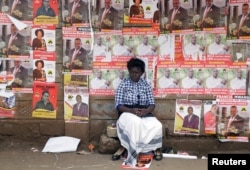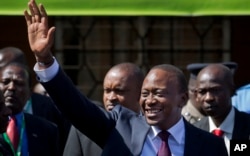Kenya’s electoral commission is appealing a court ruling that poll results announced at the constituency level are final. The electoral body says that opens the way to manipulation.
The bad blood between the Kenya's political opposition and its electoral commission has been taken to the corridors of justice three months before the August poll.
The Independent Electoral and Boundaries Commission is appealing a high court ruling that bans the commission chairman from making the official announcement of presidential vote totals from each constituency. The court ruled that vote totals announced at polling stations and the constituency level are final.
The Kenya country director of the Johannesburg based non-profit Electoral Law and Governance Institute in Africa, Felix Odhiambo, says previous electoral flaws did not favor the commission.
“What IEBC is seeking to do, is a disquisition that has been misused in this country time and again by allowing the chairperson of the commission to be the final returning officer with respect to the election of the president," he said. "If you look at 2007 elections and 2013 elections, the conduct of the chairperson of the IEBC and what the IEBC did at the national tallying center was subject to many litigations.”
It took days to announce the presidential vote results in 2007 and 2013, with charges of altering figures at the national level.
The 2007 disputed result put Kenya on the brink of civil war. Communities turned against each other, resulting in more than 1,000 deaths and hundreds of thousands left homeless.
Odhiambo says the court made the right decision.
“The high court properly read the mood of the Kenyans," he said. "The court of appeal dealt with over 188 petitions and in those petitions during 2013 elections they saw the conduct of IEBC personnel, both at the national tallying center and at the constituencies, they also then looked at the constitution and made the correct interpretation [of] the finality of voting, finality of the result of the constituency and not at the national tallying center in Nairobi.”
But the electoral commission argues the results can be altered at the constituency level and the ultimate decision should lie with its chairman.
Opposition politician Johnson Muthama threatened a boycott if the appeal favors the IEBC.
He says the commission should not try to change electoral laws, and if the law is changed, the opposition will not participate in the general election.
Last December, the electoral commission was successful in petitioning Kenya's parliament to change laws to allow the use of manual voter registration in case electronic technology fails.
President Uhuru Kenyatta is running for a second term. His closest challenger is former Prime Minister Raila Odinga.






